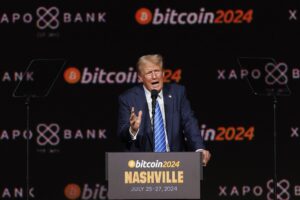Trump Supports Crypto: Will India Embrace Digital Currency Next?

Pakistan’s Strategic Embrace of Cryptocurrency: Implications for India
Unusual Developments in Islamabad
A few weeks prior to the Pahalgam incident, Islamabad witnessed a notable event. In early April, Changpeng Zhao, the founder of Binance and a prominent figure in the cryptocurrency world, accepted a role as an advisor to the newly formed Pakistan Crypto Council (PCC). Established in March, the PCC aimed to create a regulatory framework for cryptocurrencies in a nation that had historically been wary of digital currencies.
Initially, many speculated about Pakistan’s motivations for adopting cryptocurrency, with officials claiming it was a means to attract foreign investment. However, as events unfolded during Operation Sindoor, it became evident that there were deeper strategic considerations at play.
A Calculated Move
Pakistan’s collaboration with World Liberty Financial (WLF), a crypto firm associated with Donald Trump’s family, indicated a desire to strengthen ties with the U.S. This partnership, coupled with initiatives like a Nobel Peace Prize nomination for Trump, may have softened U.S. criticism of Pakistan amid ongoing conflicts.
On July 9, President Asif Ali Zardari signed an ordinance that established the Pakistan Virtual Asset Regulatory Authority (PVARA), granting it the authority to license and oversee entities involved in virtual assets. This significant step comes as Pakistan grapples with economic challenges and seeks financial assistance from the International Monetary Fund (IMF). Notably, Pakistan is not alone in its crypto ambitions; countries like the U.S. are also working to legitimize stablecoins, while Bhutan has amassed substantial bitcoin reserves.
The Global Crypto Landscape
Countries with specific agendas—whether to attract investment, evade sanctions, or gain favor with influential global players—are increasingly integrating cryptocurrency into their economic strategies. This trend raises questions about India’s position in this evolving landscape.
India’s Regulatory Dilemma
The Supreme Court of India recently questioned the government’s lack of a clear regulatory framework for cryptocurrencies. During a hearing on a bail plea related to illegal bitcoin trading, the court emphasized the need for regulation to monitor the burgeoning market. This is not the first time the judiciary has urged the government to clarify the legal status of cryptocurrencies in India.
The ongoing uncertainty has created a regulatory vacuum, leaving the crypto market in a state of flux. The Reserve Bank of India’s concerns regarding financial stability continue to influence the government’s cautious stance. Despite the Securities and Exchange Board of India (SEBI) recommending oversight from multiple regulators, a definitive policy remains elusive.
Currently, India’s regulatory framework includes a 30% tax on capital gains and a 1% tax deducted at source on transactions exceeding ₹10,000, introduced in 2022. In March 2023, the finance ministry mandated that all crypto exchanges operating in India register with the Financial Intelligence Unit–India (FIU–IND). Although there are indications that India may reconsider its approach amid growing global acceptance, a promised discussion paper outlining potential policy options has yet to be released.
Security Concerns and Monitoring
Following the Pahalgam terror attack, India’s FIU directed crypto exchanges to closely monitor transactions, particularly from Jammu and Kashmir and other border areas. Exchanges were instructed to scrutinize private wallets and transactions that lack blockchain visibility.
Experts warn that Pakistan’s flexible stance on cryptocurrency could facilitate financial flows that undermine India’s efforts to combat terrorism financing. The potential for rogue elements to exploit crypto channels poses significant risks.
Pakistan’s Strategic Vision
Pakistan’s strategy extends beyond mere partnerships; the country is also investigating bitcoin mining using surplus energy to establish a strategic reserve. Experts suggest that for Pakistan, aligning its crypto policy with U.S. frameworks serves not only diplomatic purposes but also as a means to remain relevant to American geopolitical interests.
Bhutan’s Unique Approach
In contrast to Pakistan’s security concerns, Bhutan has adopted a different model. The Himalayan nation has been mining bitcoin since 2020, leveraging its abundant hydropower resources. Bhutan views bitcoin as a tool for economic diversification, integrating it into tourism and smart city initiatives.
While India acknowledges Bhutan’s right to diversify its economy, there are apprehensions regarding reduced hydropower exports and the import of Chinese bitcoin mining equipment.
U.S. Regulatory Developments
The GENIUS Act, currently pending in the U.S. House of Representatives, aims to establish a regulatory framework for stablecoins. However, concerns have been raised about potential conflicts of interest, particularly given the financial ties between the U.S. president and World Liberty Financial.
Observers suggest that the U.S. may leverage its influence within the Financial Action Task Force (FATF) to promote the GENIUS Act as a global standard for crypto regulation, which could have significant implications for countries like Pakistan.
Recommendations for India
Experts emphasize the need for India to adopt a coherent regulatory framework to address the challenges posed by fragmented regulations. A clear policy would not only protect consumers but also enable legitimate crypto businesses to operate within a defined structure.
India must also consider regulations regarding U.S. dollar-denominated stablecoins to mitigate concerns about capital flight. As neighboring countries advance their crypto strategies, the urgency for India to establish a comprehensive policy becomes increasingly apparent. The choice is no longer about whether to embrace or reject cryptocurrency; it is about how to navigate this complex landscape effectively.







